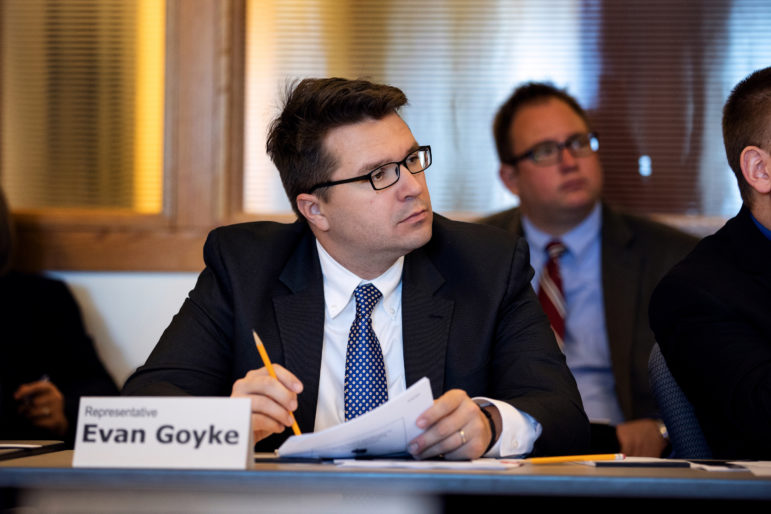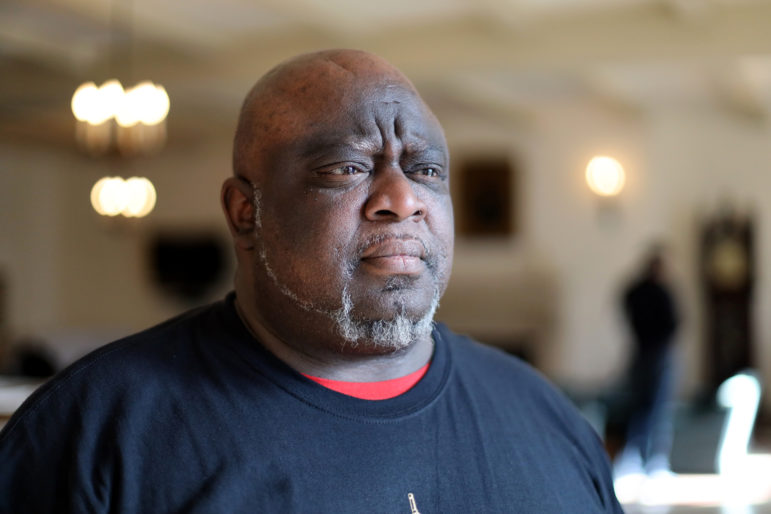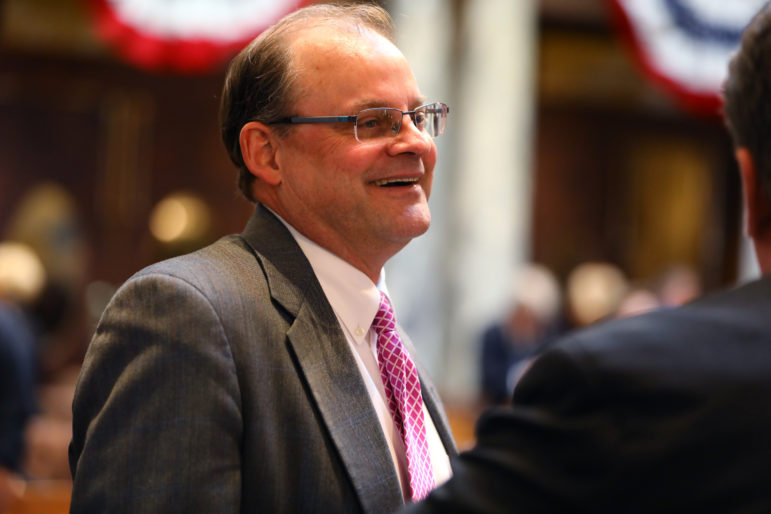Rules Violations Cause 40% of Prison Admissions
State figures show supervision violations, not new crimes, drive prison admissions.

Former prisoner Sylvester Jackson says he is constantly worried about violating terms of his extended supervision. “I go day by day, but it’s always in the back of my mind that I can lose everything without even committing a new crime.” So-called crimeless revocations now account for 40% of new admissions in the Wisconsin prison system. Gov. Tony Evers says he wants to end the practice of reincarcerating offenders for rule violations. Photo by Emily Hamer/Wisconsin Watch.
Revocations for rule violations — and not the commission of new crimes — is the No. 1 cause of incarceration in Wisconsin, accounting for 40 percent of new admissions, Wisconsin Department of Corrections figures show.
Gov. Tony Evers, who is aiming for sharp reductions in the state’s prison population, said he wants to end these so-called crimeless revocations.
The proportion of offenders reincarcerated for violating rules while on community supervision in Wisconsin has risen quickly. Such revocations made up 31% and 34% of new prison admissions in 2016 and 2017, respectively.
Nationally, 25% of prison admissions are due to rule violations, according to the Council of State Governments Justice Center’s report released this month.
Wisconsin is one of 13 states where more than one in three people in prison are there for a supervision violation, the Justice Center found. The state is ranked third in the country for how long people are supervised, according to Columbia University Justice Lab’s report.
The typical supervision length in Wisconsin is 3 years and 2 months — almost double the national average.
In July 2018, while running for governor, Evers said the Milwaukee Secure Detention Facility — the first facility in the United States built to incarcerate individuals who violate community supervision — needs to be closed “as soon as possible.” Evers’ budget, however, recommends putting $8.1 million into remodeling the facility, with a focus on improving the ventilation.
After individuals serve their period of incarceration, they are placed under extended supervision, a type of parole created under Wisconsin’s truth-in-sentencing law. Time spent on extended supervision has to be at least 25 percent of the prison sentence.
There are three main ways supervision can be revoked: a new sentence for a new crime; a revocation plus a new sentence; or a rule violation, which inmate advocates often refer to as a “crimeless revocation.”
Unlike parole, offenders who violate rules can be sent back to prison to serve the entire period of extended supervision, former Wisconsin Policy Forum spokesman David Callender said. In an October 2018 report the group, which researches and advocates for efficiencies in state and local government, analyzed the numbers behind the state’s prison admissions.
“Let’s say you have three years on extended supervision. If on the very last day you commit an offense and have to go back to prison, you could potentially go back for that entire three years,” Callender said. “Generally, the longer that somebody is looking over your shoulder and the longer you’re under supervision, the more likely it is that you may do something wrong and end up back in prison.”
Lawmakers, experts call for change
The revocation system is “ripe for reform,” said Rep. Evan Goyke, D-Milwaukee, a member of the Assembly Corrections Committee.

Rep. Evan Goyke, D-Milwaukee, a member of the Assembly Corrections Committee, says he favors reducing the practice of reincarcerating offenders for community supervision rule violations. Goyke is seen here on Oct. 16, 2018, at a Legislative Council meeting in Madison, Wis. Photo by Emily Hamer / Wisconsin Watch.
Wisconsin lost the opportunity to have the Pew Charitable Trusts study its community supervision system after Assembly Speaker Robin Vos objected, citing perceived bias in favor of Democrats. But Kevin Carr, who leads the Department of Corrections, said the state is exploring “other alternatives to accomplish that same objective.”
“We just have to find out what’s worked in other areas and then adapt it to a Wisconsin model that works for us,” Carr said. “I believe there are examples from around the country that we can learn lessons from, and we can take those lessons and apply them here and increase the efficacy of what we’re doing (with supervision).”
The American Civil Liberties Union estimates that by reducing the amount of time served due to a revocation and reducing revocation admissions there could be 8,275 fewer people in prison by 2025. The ACLU combined both crimeless revocations and people revoked for committing new crimes in their estimate.
In his own analysis, Goyke said reducing crimeless revocations by 25% would lead to 275 fewer inmates in prison per year, saving upwards of $5 million a year. By reducing crimeless revocations by 50%, 550 fewer individuals will be in prison per year, at a savings of about $10 million, Goyke said.
Return to prison ‘always in the back of my mind’
For Milwaukee resident Sylvester Jackson, who began serving 10 years of extended supervision in April 2017, there is “no normal.” Jackson previously served 10 years in prison and is a registered sex offender. He spent more than a month at the Milwaukee Secure Detention Facility for allegedly violating his supervision.
“I have eight years to go (on supervision),” Jackson said. “I go day by day, but it’s always in the back of my mind that I can lose everything without even committing a new crime.”

Former prisoner Sylvester Jackson says he has eight years remaining on community supervision. He fears returning to prison even if he commits no new crime. Forty percent of Wisconsin prison admissions are offenders who have not committed new crimes but who are accused of violating rules of supervision. Jackson is seen during the Madison Action Day for Wisdom, the statewide faith-based organization, on March 26, 2019, in Madison, Wis. Photo by Emily Hamer / Wisconsin Watch.
Goyke said some of the top reasons for crimeless revocations included failing a treatment program, failing a community-based program and refusing to comply with supervision. On average, someone sent back on a crimeless revocation is incarcerated for 18 months, according to Wisdom.
Stopping or reducing crimeless revocations would also save the state money. Currently, taxpayers pay $147.5 million per year to incarcerate individuals for crimeless revocations, according to a report by Columbia University’s Justice Lab.
In an interview, Carr said he is willing to consider making changes to the state’s supervision rules.
“I’m certainly open to looking at the rules that we have in place for individuals and whether or not those rules are reasonable and whether or not a person should be subjected to revocation for violating a certain category of rules that are not serious,” he said. “But then there are rules that a person can violate that I think we would all agree require serious attention and should not be treated lightly.”

Wisconsin Department of Corrections head Kevin Carr describes various strategies for achieving Gov. Tony Evers’ goal of sharply reducing the state’s prison population. Wisconsin was among 19 states where prison populations increased in 2018. The system is currently 33 percent above capacity. Carr is seen during an interview with Wisconsin Watch at the DOC headquarters in Madison, Wis., on June 19, 2019. He is seen here with Makda Fessahaye, Administrator for the Wisconsin Department of Corrections Division of Adult Institutions. Photo by Alisa Ivanitskaya / Wisconsin Watch.
As someone who was formerly incarcerated and revoked for a rule violation, Caliph Muab’El wants to bring attention to crimeless revocations as a driver of overcrowding in the state prisons, which are currently 33 percent over capacity.
“People are being sent back to prison without having committed a new crime, and this is causing the prison system to stay full and continue to overflow, going against maximum capacity,” Muab’El said.
“They’re creating space inside of these dormitories … that definitely lead to Eighth Amendment violations — cruel and unusual punishment. There are two beds in the room, and you’re telling me you’re going to create a third space in a room that’s already designed for one person? The reality in that alone is a sense of deprivation. It’s cruel and unusual.”
Jackson feels blacks are being targeted by the extended supervision system. One out of eight black men in Wisconsin is under community supervision, according to the Justice Lab’s report.
“It makes you feel very uncomfortable and hopeless unless you’ve got a strong will and strong mind to fight for change,” Jackson said. “I’m willing to fight for a change because it’s not right.”
Rules sometimes ‘unclear, arbitrary’
There are 18 standard rules of community supervision, according to the DOC. Rep. Michael Schraa, R-Oshkosh, said there are many rules that need to be “revamped.” Schraa is the chairman of the Assembly Corrections Committee.
Among the standard rules is reporting all police contact within 72 hours, obtaining a travel permit before leaving Wisconsin and reporting for scheduled and unscheduled appointments.

State Rep. Michael Schraa, R-Oshkosh, chairman of the Assembly Corrections Committee, said there are many of the rules of community supervision need to be “revamped.” He is seen at the Wisconsin State Capitol in Madison, Wis., on Jan. 24, 2018. Photo by Coburn Dukehart / Wisconsin Watch.
Jackson said these rules are almost impossible to keep track of, especially since probation and parole officers have wide discretion to impose additional restrictions. Sometimes, he said, he was put in jail without explanation. This is something the Justice Lab’s report found as well — supervision rules are “extensive, often unclear and can be arbitrarily enforced.”
Having to keep track of a set of rules where it is almost impossible to follow them all can lead to chronic stress, said Geoffrey Swain, a professor at the University of Wisconsin-Madison School of Medicine and Public Health, who has studied the health implications of criminal justice policies.
“What happens is people are trying to follow these rules and are worried they’re going to break one,” Swain said. “When they’re extra worried, they’re extra vigilant … (and) they’re under extra stress. They’re more at risk of high blood pressure, diabetes and, ultimately, an early death because they’re constantly worried that they’re going to be in a situation where someone will say they’ve broken one of these rules and get sent back to prison.”
Wisconsin Watch’s collaborations with journalism students are funded in part by the Ira and Ineva Reilly Baldwin Wisconsin Idea Endowment at UW-Madison. The nonprofit Wisconsin Center for Investigative Journalism (www.WisconsinWatch.org) collaborates with Wisconsin Public Radio, Wisconsin Public Television, other news media and the UW-Madison School of Journalism and Mass Communication. All works created, published, posted or disseminated by Wisconsin Watch do not necessarily reflect the views or opinions of UW-Madison or any of its affiliates.
Cruel and Unusual
-
Jail Fees Can Leave Inmates in Debt
 Oct 4th, 2019 by Izabela Zaluska
Oct 4th, 2019 by Izabela Zaluska
-
Evers Faces Hurdles to Cutting Prisons
 Jul 1st, 2019 by Izabela Zaluska
Jul 1st, 2019 by Izabela Zaluska
-
Interrogation Technique Causes False Confessions?
 Jul 24th, 2017 by Krista Johnson
Jul 24th, 2017 by Krista Johnson





















